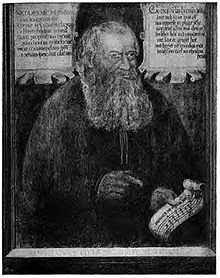Nicholas Herman
Nikolaus Herman (* around 1480 or around 1500 in Altdorf near Nuremberg ; † May 3, 1561 in Sankt Joachimsthal , Bohemia ) was a cantor and teacher and wrote numerous Protestant hymns .
Life
Herman came in 1518 as a cantor and teacher at the Latin School of Jachymov. He was a supporter of the Reformation , a letter from Martin Luther to him from November 6th, 1524 has come down to us. In St. Joachimsthal he worked with Johannes Mathesius , who was rector of the school from 1532 and pastor from 1540. On June 24, 1557, Herman retired. His songs, whose target group he considered primarily the children he taught, he published in 1560 under the title The Sunday Evangelia composed in songs for children and Christian housefathers over the year .
From the songs of the Protestant hymn book and Catholic praise of God come from him:
Text and melody to:
- Praise God, you Christians all alike (EG 27, GL 247, GL old 134)
- The glorious day has appeared (EG 106, GL old 225)
Only the text of:
- Today the dear angels (middle part of EG 29)
- We want to sing a song of praise (EG 141)
- True Faith Quenching God's Wrath (EG 413)
- The bright sun shines now (EG 437, GL old 667)
- Down is the sunshine (EG 467, GL (Bamberg) 715, GL old 705)
- In God's name we drive (EG 498)
- When my hour is available (EG 522, verses 1-4, GL old 658)
To be today die dear angels is originally an independent song and translation of the Latin Nunc angelorum gloria from the Moosburg Gradual of 1360. It was only later by Michael Praetorius (Musae Sioniae, 1607) with the anonymous translations of Quem pastores laudavere and Magnum nomen Domini Emanuel summarized in the so-called Quempas . It also appears in this form in the EC under number 29.
The melody for We thank you, Lord Jesus Christ, that you died for us (EG 79) he created for his text We thank you, Lord Jesus Christ, that you rose from death (EG 107, verse 1). The text Heut singt die liebe Christenheit (EG 143) by Detlev Block is based on Herman's German translation of the hymn Dicimus grates tibi Philipp Melanchthons . Not in the ground floor, but in its predecessor, the Evangelical Church Hymn book from 1950, is his text Bescher uns, Herr, das Daily Brot (EKG 376).
Shortly before Herman's death, in 1561, his translation of a Latin wedding poem by Johannes Mathesius with the title Oeconomia appeared , which he had written a year earlier for the marriage of a friend. This extensive poem with the German title Haushaltung - it comprises fifteen pages in print from 1564 - is a guide for the Christian choice of partner and house community. At the end of the 16th and 17th centuries it was reprinted or added to other scripts so often that it became the most widespread German-language marriage script of the early modern period.
Remembrance day
May 1st in the Evangelical Name Calendar .
literature
- Friedrich Wilhelm Bautz : Herman, Nikolaus. In: Biographisch-Bibliographisches Kirchenlexikon (BBKL). Volume 2, Bautz, Hamm 1990, ISBN 3-88309-032-8 , Col. 747-749.
- Carl Bertheau: Herman, Nikolaus . In: Allgemeine Deutsche Biographie (ADB). Volume 12, Duncker & Humblot, Leipzig 1880, pp. 186-188.
- Walter Blankenburg , Thomas Schmidt-Beste: Herman, Nikolaus. In: Ludwig Finscher (Hrsg.): The music in past and present . Second edition, personal section, volume 8 (Gribenski - Hilverding). Bärenreiter / Metzler, Kassel et al. 2002, ISBN 3-7618-1118-7 ( online edition , subscription required for full access)
- Adalbert Elschenbroich: Herman, Nikolaus. In: New German Biography (NDB). Volume 8, Duncker & Humblot, Berlin 1969, ISBN 3-428-00189-3 , p. 628 ( digitized version ).
- Philipp Wackernagel : The German hymn from the earliest times to the beginning of the 17th century. 5 volumes. Teubner, Leipzig 1864–1877; in Volume 3, pp. 1161–1243 All texts by Nikolaus Hermans are printed ( digitized in the Google book search).
- Constantin von Wurzbach : Herrmann, Niklas . In: Biographisches Lexikon des Kaiserthums Oesterreich . 8th part. Imperial and Royal Court and State Printing Office, Vienna 1862, p. 392 ( digitized version ).
Web links
- Works by and about Nikolaus Herman in the catalog of the German National Library
- Works by and about Nikolaus Herman in the German Digital Library
- Publications by and about Nikolaus Herman in VD 16 .
- Publications by and about Nikolaus Herman in VD 17 .
- Nikolaus Herman in the Bavarian Musicians' Lexicon Online (BMLO)
- List of songs by Nikolaus Herman in the Christian song database
- List of editions of the German translation of Johann Mathesius' Oeconomia in Cinquecentine.de
Individual evidence
-
^ Digitized
commons: Category: Oeconomia or report on the Christian household - ↑ Nikolaus Herman in the Ecumenical Lexicon of Saints
| personal data | |
|---|---|
| SURNAME | Herman, Nicholas |
| BRIEF DESCRIPTION | German cantor, teacher and hymn creator |
| DATE OF BIRTH | 15th century or 16th century |
| PLACE OF BIRTH | Altdorf near Nuremberg |
| DATE OF DEATH | May 3, 1561 |
| Place of death | St. Joachimsthal |
